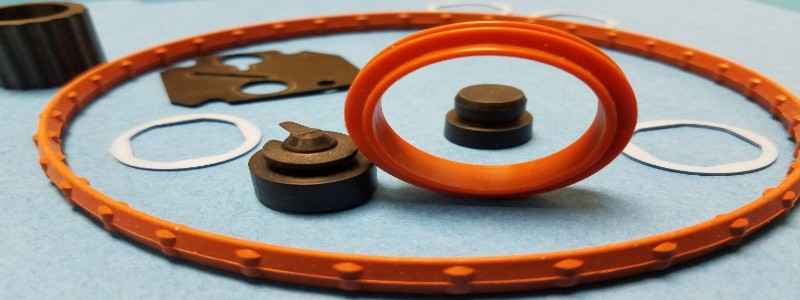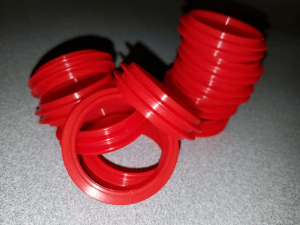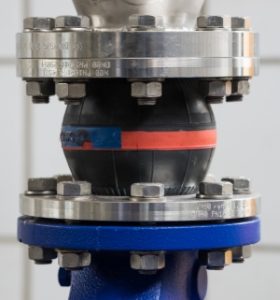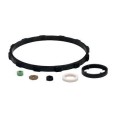Home » Sealing Products » Custom Molded Seals
Custom Molded Seals

Web Seal can help you find virtually any shape, cross-section or style of custom molded seals.
Advantages of Custom Molded Seals
Custom molded seals are cast from molds designed for a unique set of engineering requirements, balancing manufacturing elements such as production cycles, curing and environmental factors with the function and volume of the seal.
 While more expensive than standard O-rings and gaskets, custom molded seals provide many advantages for complex and critical applications, including:
While more expensive than standard O-rings and gaskets, custom molded seals provide many advantages for complex and critical applications, including:
- Nearly limitless sizes and geometries, designed exclusively for your specific application profile
- Excellent dimensional tolerances
- Superior leak prevention
- Ability to incorporate reinforcements, internally or externally
- Ability to add permanent tracking or other identification information etched onto the seal
Custom molded seals are precision manufactured for quality through various techniques:
- Compression molding
- Transfer molding
- Injection molding
- Liquid injection molding
Compression molding is a low-cost, comparatively simple method, where uncured elastomer is placed into each cavity of the mold to be formed into a seal via pressure, heat and time. The process generates little to no material waste.
Best for small and medium part sizes, transfer molding is a combination of compression and injection molding processes. Pre-measured polymers are preheated, then transferred into a closed mold for compression. The process produces very accurate dimensions, can have multiple cavities, and has little flash.
Transfer molding allows for inserts to create more complex seals. The process uses simpler, less expensive molds than injection molding, which are quicker to build, and results in faster cure times. The process can have more material waste than other techniques, and additional steps may be added to remove flash.
Injection molding is ideal for high volume runs of thousands or millions, due to faster production speeds, excellent dimensional tolerances, accommodation for larger size parts, and capacity for more cavities. Injection molding does involves a higher initial investment, with highly engineered tooling. Molten liquid polymers are machine-mixed and injected into split-die molds through a gate, at high temperatures. Final seal components are released after the molds cool.
Liquid molding is particularly cost-effective for low-volume production runs and prototyping. The process involves less expensive molds, typically made of soft elastomers.
Types of Custom Molded Seals
Custom molded seals are used in nearly every industry and for a wide variety of functions:
 Accumulator – used to accommodate fluctuations in system volume
Accumulator – used to accommodate fluctuations in system volume- Ball Seals – commonly used in check valves and as a bumper
- Bladder Seal – pneumatic bladder that inflates to create a barrier seal
- Bushing – cylindrical sleeve, often used in fluid power components
- D-Shaped Ring – solid or hollow with a flat base, prevents spiral failure
- Damper Seal – typically used in industrial shut-offs to minimize leakage along with modulating capability
- Diamond Seal – extreme wear capabilities for abrasive or erosive conditions
- Duckbill Seal – elastomeric backflow prevention component
- Dust Cover Seal – provides a barrier against dust and other particulates, oil, grime and scratches
- H-Shaped Ring – solid or hollow, fits straight-walled or dovetail grooves
- Lip Seal – maintains friction and lubrication while eliminating contaminants
- Press-In-Place Seal – one flat surface has a groove design cut into it to retain the O-ring in the gland
- Piston Seal – split ring in a reciprocating engine to prevent fluid from flowing across the cylinder head
- Plugs – wide variety of connectors, caps and cavity seals
- Rubber Bellows – protective cover (dust boots or dust seals) that allows for specified range of motion
- Self-Retaining Seal – hollow or solid, friction maintains proper sealing position in the groove
- Trapezoid Ring – extruded shape for difficult sealing geometries
- Vibration Mounts – absorbers or isolators made of elastomer/metal combinations
- X-Ring (Quad™Ring) – essentially an O-ring with a four-lobed profile that offers twice the sealing surface and better gland stability
More Custom Molded Seals Information
 Press-in-Place SealsPress-in-Place (PiP) or "drop-in-place" seals are static seals that overcome installation issues and sealing performance problems common with many typical face seal products, such as an O-ring. ...
Press-in-Place SealsPress-in-Place (PiP) or "drop-in-place" seals are static seals that overcome installation issues and sealing performance problems common with many typical face seal products, such as an O-ring. ...

